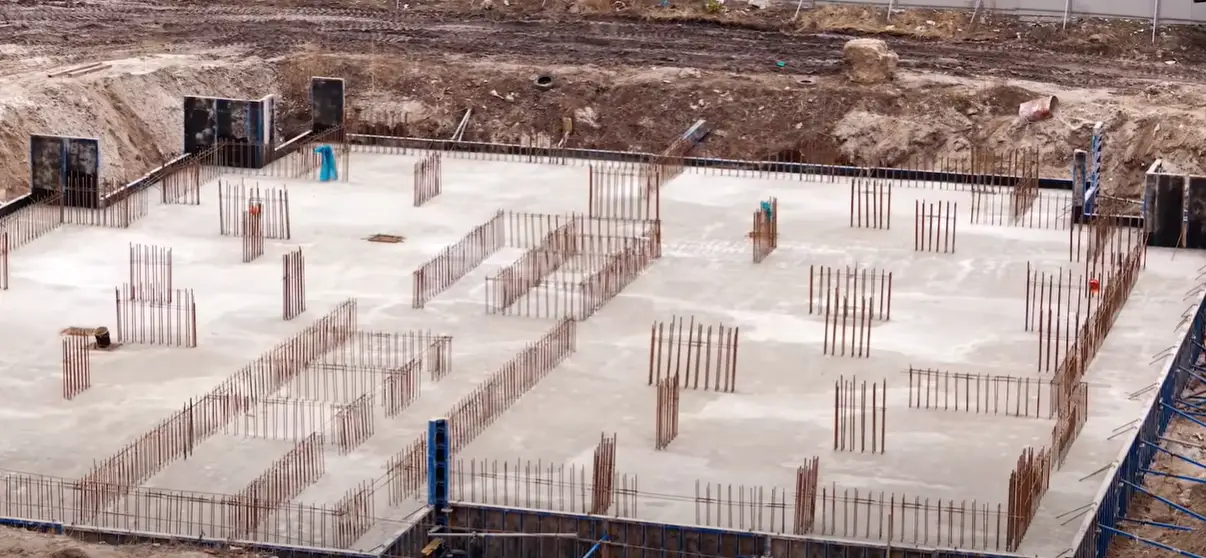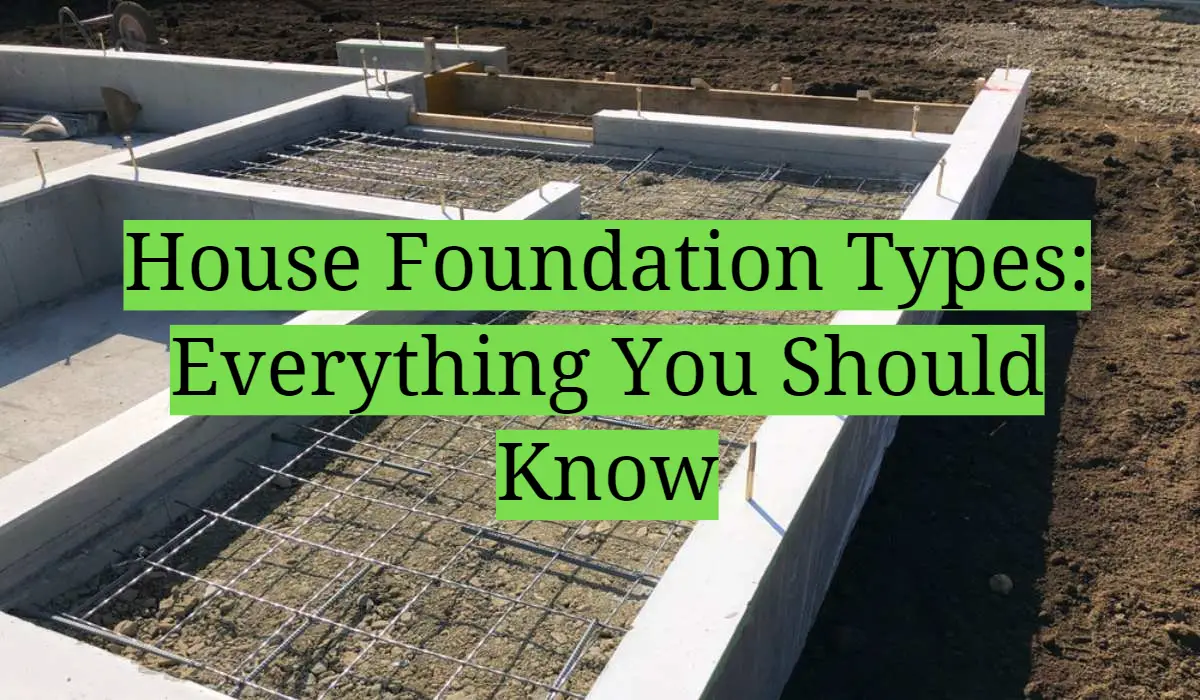There are many different types of house foundations, and it can be confusing to know which one is right for your home. This article will explain the most common foundation types, as well as their pros and cons. If you are in the process of building a new home, or just considering your foundation options, this guide will give you all the information you need to make an informed decision.
What is a foundation?
Before we get into the specifics of different types of house foundations, let’s talk about what a foundation is. In construction, the foundation is the part of your home that supports the entire structure and bears its weight. It also works to transfer these loads safely to the ground below. The foundation can be made from many different materials and constructed in multiple ways, depending on soil conditions, climate, local building codes, and more. [1]

Types of foundation
When it comes to building a house, the foundation type you choose is one of the most important decisions you will make. The type of foundation determines how strong and durable your home is, as well as what kind of repairs may be needed in the future. We’ll cover all types of foundations for houses so that you can make an informed decision about which type best suits your needs.
Basement foundation
Basement foundations are one of the most common types of foundations used in homes today. These foundations require digging down below the frost line and pouring a concrete pad or wall to act as a base for the house’s structure. Basements can be full-sized, or just large enough for mechanical systems and storage. They also offer a variety of options when it comes to finishing them off, including drywall, carpeting, tile, and more.
Crawl Spaces
Crawl spaces are another popular option for foundations. These foundations involve digging out a shallow hole and then filling it with gravel or crushed stone before constructing the floor joists, beams, and other structural components of the home above it. Crawl spaces offer easy access to plumbing, wiring, ductwork, and more from below. They also can provide better insulation than basements since they avoid some of the issues that come with below-ground construction such as moisture buildup and flooding.
Slab foundation
A slab foundation, also known as a monolithic slab, is created by pouring concrete directly onto the ground in one continuous pour. Slab foundations are commonly used in areas with warm climates as they provide good insulation against heat, cold and moisture. They are usually reinforced with steel rods and mesh to add extra strength to the structure. This type of foundation is relatively low-cost and easy to construct but can crack if there is movement on the property such as settling or shifting soil. [2]
Foundations and insurance
It is important to consider the impact that your foundation type will have on your home insurance. Different foundations are vulnerable to different types of damage and may be more or less expensive depending on the level of coverage needed. For example, basement foundations can be prone to water damage, while slab foundations may need additional structural support due to ground movement. Before you make a decision about what type of foundation to build, it’s important to consult with your insurance provider in order to understand the potential risks and any associated costs.
Policy Exclusions
Foundation types are an important consideration when building a house. Different soil conditions, climates, and other factors will determine the type of foundation necessary for your particular home. Additionally, there may be local building codes or policies that dictate the kind of foundation you have to use. It’s essential to understand these exclusions before selecting a foundation type for your home.
House Foundation Types: A Comprehensive Overview
The foundation of a house is crucial to its structural integrity and stability. Below, we provide a comprehensive guide to different house foundation types, including their characteristics, advantages, and considerations to help you understand the options available for your home.
| Type | Characteristics | Advantages | Considerations |
|---|---|---|---|
| Concrete Slab | Single, thick concrete slab that acts as both foundation and floor. | Cost-effective, suitable for flat terrains, and minimizes crawl space. | Less insulation, potential for cracking due to soil movement. |
| Crawlspace | Raised foundation with space for access, utilities, and ventilation. | Access for repairs, better insulation, and protection from flooding. | May require pest control, potential for humidity issues. |
| Basement | Below-ground foundation with living or storage space. | Added living space, storage, and potential for higher home value. | Higher construction and maintenance costs, vulnerability to water damage. |
| Pier and Beam | Uses piers or posts to elevate the house above the ground. | Prevents moisture and pest problems, easy access to utilities. | May require additional maintenance and periodic adjustments. |
| Concrete Block | Constructed using concrete blocks or masonry units. | Durable, fire-resistant, and provides good insulation. | Requires skilled labor, potential for moisture and cracking. |
| Helical Piles | Steel piles screwed into the ground to support the foundation. | Quick installation, suitable for unstable soils, minimal disturbance. | Cost, limited suitability for very heavy structures. |
Explanation of the Table:
- Type: Describes different foundation types.
- Characteristics: Explains the basic features of each foundation type.
- Advantages: Highlights the benefits of each foundation type.
- Considerations: Mentions potential drawbacks or considerations for each type.
By understanding these foundation types and their characteristics, advantages, and considerations, you can make an informed decision about the best foundation type for your home’s location, climate, and your specific needs.
FAQ
What is the strongest type of foundation?
The strongest type of foundation is a basement foundation. It offers the most protection from moisture and other elements, as well as providing maximum strength and stability for your home. [3]

How do I make sure my foundation is waterproof?
A waterproof foundation should be constructed with a concrete sealer or membrane. It’s important to take into account any potential sources of water, such as plumbing lines or creeks, and make sure they are properly sealed off before pouring the foundation. [4]
How much does a foundation cost?
The cost of a foundation depends on the type, size and complexity of the project. Generally, basement foundations are more expensive than crawl spaces or slab foundations due to their complexity and need for extra waterproofing measures.
What factors should I consider when choosing a foundation type?
When choosing a foundation type, consider factors like soil type, local climate, budget, and intended use of the space. Certain foundation types may be more suitable for specific conditions.
What are the advantages of a slab foundation?
Slab foundations are cost-effective, require minimal site preparation, and provide a single-level surface for easy accessibility. They are also less susceptible to pest intrusion compared to other foundation types.
What are the benefits of a crawl space foundation?
Crawl space foundations offer access to utilities and can provide better ventilation and insulation options. They are often used in areas with moisture concerns to prevent direct soil contact.
Why would I choose a basement foundation?
Basement foundations provide additional living or storage space and are particularly beneficial for regions with harsh climates. They offer protection against extreme temperatures and natural disasters.
What are the advantages of a pier and beam foundation?
Pier and beam foundations are ideal for uneven terrain and areas with expansive soil. They allow for better ventilation and moisture control and provide easy access to plumbing and electrical systems.
How does the soil type affect foundation choice?
Different soil types expand and contract differently with moisture changes. Expansive soils can put pressure on foundations, potentially causing issues. Soil conditions will influence the suitability of different foundation types.
Can I add a basement to an existing house?
Adding a basement to an existing house is a complex and costly process that typically involves excavating beneath the house. It’s recommended to consult with a structural engineer to assess the feasibility and potential impact on the existing structure.
Can foundation types be mixed in a single house?
In some cases, houses might have different foundation types for different sections. For instance, a house could have a combination of a slab foundation and a basement. However, this requires careful engineering and planning.
How do I ensure proper drainage with different foundation types?
Proper drainage is crucial for all foundation types. Grading the land to ensure water flows away from the foundation, installing gutters and downspouts, and using appropriate drainage systems can help prevent moisture-related issues.
Is it possible to change the foundation type of an existing house?
Changing the foundation type of an existing house is a major undertaking and might not always be feasible. It would likely involve significant structural modifications and is best approached with guidance from professionals like architects and engineers.
Useful Video: Why Buildings Need Foundations
Conclusion
There are a few different types of foundations you can choose from when building a house and it is important to know the differences. The foundation type you choose will be based on many factors, such as climate, price, and soil conditions. We hope this article has helped you better understand the different types of house foundations and that you feel equipped to make an informed decision about which one is right for your home. If you have any questions or would like more information, please don’t hesitate to reach out to us. We’re always happy to help in any way we can!
References
- https://theconstructor.org/geotechnical/foundation-in-construction-purpose-functions/18963/
- https://civiljungle.com/floating-slab-vs-monolithic-slab/
- https://civiconcepts.com/blog/best-foundation-for-house
- https://www.concretenetwork.com/concrete/waterproofing_concrete_foundations/














Leave a Reply